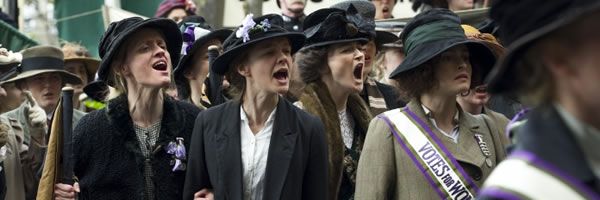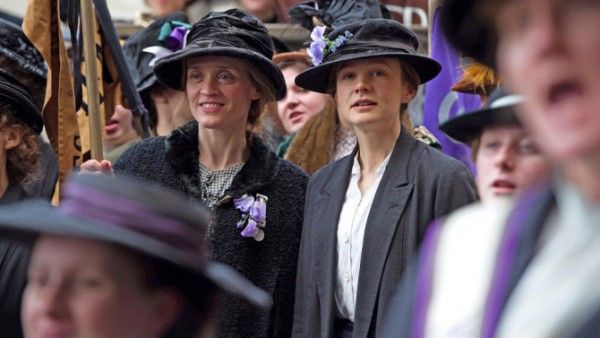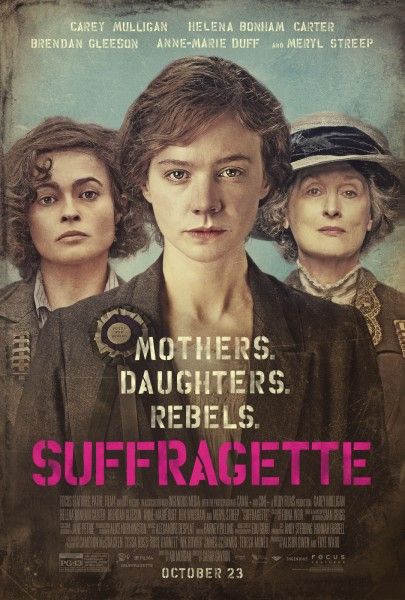"Votes for Women" is presented as an individual plea in Sarah Gavron's Suffragette. Sure, many women band together and begin to hold meetings, protests, and bombings in the streets of 1912 London to fight for their right to vote, but the phrase is most often used when one woman shouts it in defiance. In a way, it makes sense, as one vote belongs to one woman, but the movement is presented as an individual one.
Despite Carey Mulligan's great performance and a great attention to period detail, Suffragette misses chances to humanize a few of the women who paid the ultimate sacrifice for all women. Instead where Suffragette is more successful—and perhaps as an attempt to lightly tie this women's movement to modern times—is that it feels less about women's suffrage and more about woman's suffering. More specifically, Mulligan's singular suffering, and how that is aided by the law not being on her side.
Mulligan plays Maud Watts, a laundry worker who hides from the suffragettes when she first encounters them in the streets throwing rocks into store windows. It's hinted that her boss subjected her to undesired sexual advances when she was younger, but she calls it "a good job." Maud is married to one of the men who runs the laundry (Ben Whishaw), and the two of them have an adorable son (Adam Michael Dodd). Maud isn't well off, but she doesn't want to rock the boat, and she's complacent.
The main suffragettes are all in her immediate circle, however. Most prominently, the self-trained nurse who treats her son, Edith (Helena Bonham Carter), and a vocal co-worker, Violet (Anne-Marie Duff). Maud attends a meeting, but does not identify as a suffragette until she walks in on her foreman (Geoff Bell) in a compromising position with one of the younger launder-women, reminding her that her past suffering will now happen to another woman. It's this mutual female suffering, lack of law recourse that pushes Maud into the Suffrage Movement—even though she admits she never thought about voting before. After Maud testifies on behalf of her laundry co-workers after Violet cannot take the stand because she'd been beaten by her husband, she becomes a full-time suffragette—and a full-time sufferer.
Maud and her fellow women are beaten in front of Parliament after shouting at the judges who voted against adding a voting bill referendum. They are imprisoned. They go on hunger strike. But all of this takes a backseat to Maud's own personal suffering. Her husband, is prodded at work to "control his woman" after Maud starts appearing on the front pages of the newspapers. He kicks her out of the house and forbids contact with their son. This is legal because women had no parental or property rights at the time. Now living primarily within an abandoned church, Mulligan gives a strong, hopeful, but incredibly sorrowful performance as she sneaks visits to her son's window and school.
But while focusing chiefly on Maud does bring us closer to her, it separates us from the suffering of the suffrage movement. We are robbed of getting to know Emily Wilding Davison (Natalie Press) who does feature in the film, but we have no connection to her, and when she does pull off her famous sacrificial protest we are denied an extra emotional pull. In addition to Davison's famous act, she also received the harshest force-feedings of any of the prisoners who were held for their participation in a bombing. But again, we only see Mulligan's suffering, which would be fine if the film didn't thrust Davison in toward the end without building her character up within the movement.
In the end, Gavron's focus on Maud helps lift the film above slogans and marches, and makes it more personal. But when the fight becomes more of a war we lack the attachment to the movement's biggest losses.
Grade: C+
Note: I didn't mention Meryl Streep. Streep has a one-scene cameo as Emmeline Pankurst, the leader of the Suffragette movement. She's there to fight the good fight, put some extra butts in the seats—and good for her!—but her prominent inclusion in the marketing is misleading.
‘Suffragette’ premiered at the Telluride Film Festival on September 5th; it will be released in theaters on October 23rd.
Click here for all of our Telluride 2015 coverage. Click on the links below for our other reviews and diary round-ups:



